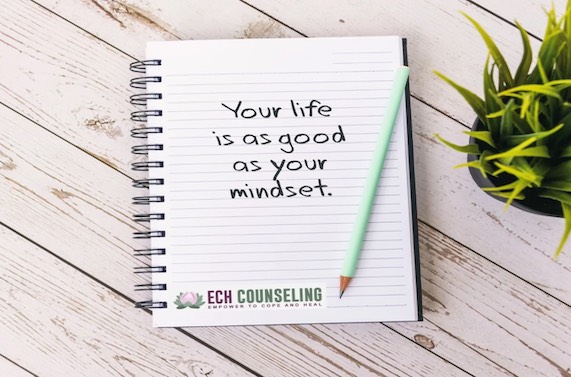
Written by Jennifer Cox LCPC
This month let’s consider our thoughts and how they impact our emotions and behaviors.
How do you think thoughts such as the following impact our actions and how we truly feel about ourselves?
-I can’t, I might make a mistake and that is embarrassing
-That won’t work, I am not going to try something new, I might fail
-I don’t need to put any more effort into ‘xyz’
The concept of mindset plays a crucial role in shaping an individual’s beliefs, attitudes, and behaviors. Two prominent mindsets that often come up in discussions are the fixed and growth mindset.
Fixed Mindset:
A fixed mindset is characterized by the belief that intelligence, abilities, and talents are fixed traits that cannot be changed. Individuals with a fixed mindset tend to avoid challenges, give up easily in the face of obstacles, and view effort as useless. They may feel threatened by the success of others and see feedback as a personal attack on their abilities.
Growth Mindset:
On the other hand, a growth mindset is the belief that intelligence and abilities can be developed through dedication and hard work. People with a growth mindset embrace challenges, persist in the face of setbacks, and see effort as a path to moving forward. They are inspired by the success of others and view feedback as an opportunity for growth and learning.
Key Differences:
1. Response to Challenges: Individuals with a fixed mindset may avoid challenges to protect their self-image, while those with a growth mindset see challenges as opportunities to learn and improve.
2. Persistence: People with a growth mindset are more likely to persevere through difficulties and setbacks, while those with a fixed mindset may give up easily.
3. View of Effort: A growth mindset values effort and sees it as a necessary step towards improvement, whereas a fixed mindset may believe that talent alone leads to success.
4. Feedback: Those with a growth mindset welcome feedback as a means to learn and grow, while individuals with a fixed mindset may interpret feedback as a criticism of their abilities.
Developing a Growth Mindset – Here are some tips to foster a growth mindset:
– Embrace challenges and see them as opportunities for growth
– Cultivate a passion for learning and continuous improvement
– Practice resilience and persistence in the face of obstacles
– Seek feedback and use it constructively to enhance your skills
– Surround yourself with positive and supportive individuals who encourage your growth
Now that you learned a bit about mindsets, try to change the statements above to more of a growth mindset such as:
-I can learn from my mistakes
-Even though this might be challenging, I will get better with practice
-With more effort, I can try and improve
Having a growth mindset is empowering – It is about embracing challenges, learning from failures, and continuously improving throughout your life – To move forward.
Let us work together to create a world where mental health is prioritized – Where everyone feels safe and supported, empowered on their healing journey towards wellness.
Reach out today at info@echcounseling.com or 815-363-0864

